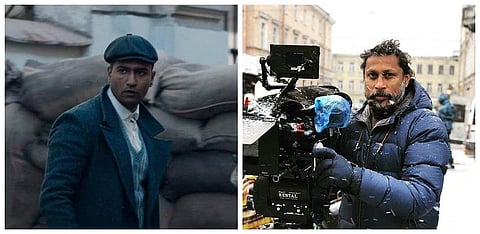
- LIFESTYLE
- FASHION
- FOOD
- ENTERTAINMENT
- EVENTS
- CULTURE
- VIDEOS
- WEB STORIES
- GALLERIES
- GADGETS
- CAR & BIKE
- SOCIETY
- TRAVEL
- NORTH EAST
- INDULGE CONNECT

Shoojit Sircar makes light, lovable comedy dramas, except when he doesn’t. Fans of Piku, Vicky Donor and Gulabo Sitabo may struggle to recognize Sardar Udham, which places pain and gloom over humorous tracks. Its only companion, in Shoojit’s oeuvre, is Madras Cafe, another large-scale epic in a foreign land. That and possibly Yahaan (2005), his debut film backdropped on the Kashmir conflict. I tell the director it seems like there are two Shoojit Sircars.
“I guess so,” he smiles in an interview with Cinema Express. “I started with Yahaan and then Madras Cafe. Somewhere in between, a Vicky Donor happened, and a Piku. I discovered I have humour and sarcasm in me too. But political films, books and essays do affect me, and I look into that as well.”
The journey of Sardar Udham started in Shoojit’s college days. He read extensively about the freedom struggle, especially the young revolutionaries out of Bengal and Punjab. Later, a visit to Jallianwala Bagh—where hundreds of protestors were gunned down under British rule—shook him deeply. The film pushes this incident to the end of its runtime. Instead, it starts with Udham (Vicky Kaushal) as a young man in prison. It’s 1931, Bhagat Singh’s HSRA has been crushed and outlawed. We meet Udham at his lowest, then watch as he makes the arduous trek to England.
“I was interested in the resilience and courage of this person,” Shoojit explains. “We already know he’s been in WW1. He used to work for the railways. He also did some revolutionary work underground. He’d been in Canada and USA. All these aspects of his life and his desire to start a movement fascinated me.”
Like his mentor and friend, Bhagat Singh, Udham is remembered for his one violent act against the crown. In 1940, he entered Caxton Hall and shot Michael O’Dwyer, the former lieutenant-governor of Punjab. Any other film would milk this event for its climax; a 1999 version starring Raj Babbar did the same. Shoojit, though, doesn’t go down that road. He closes the killing early and dedicates much of the film to the before and after.
“I wanted to portray what was going on in Udham’s mind,” Shoojit says. “His letters were published posthumously but not everything is there. We had to thread it with small incidents from various sources. Because we didn’t have much, we stuck with what we knew.”
A curious omission is the widespread reaction to Udham’s actions, with Mahatma Gandhi condemning the assassination as an ‘act of insanity’. The film, though meticulously researched, does not comment on the violence-non-violence rift that existed among our freedom fighters at the time.
“Everyone has a path,” Shoojit elucidates. “Mahatma Gandhi had his path, so did Udham Singh. Whatever he did in that situation, he went on with the same angst he felt against the British rule. I won’t judge, sitting here in 2021, what went on in their minds and what they did. I can only fact-check and show what happened.”
As a period film, Sardar Udham is surprisingly low on exposition. Much of it is wrapped up in flashback, most memorably the ones featuring a young Bhagat and Udham. In one scene, the leader tells his protégé that a revolutionary cannot be ‘biased and communal’— a line that speaks to 2021 as much as 1928. It’s also hard not to connect the film to current events, notably the ongoing farmers’ protest that began in Punjab. Does Shoojit see the film as speaking to its times?
“My job as a personality and what I know is cinema. My expression will always come through cinema. The technical politics of it I won’t be able to comment on unless my own expression is stopped. So the audience will have to draw that line, not me.”
This is Shoojit’s third collaboration with cinematographer Avik Mukhopadhayay. Minimizing visual effects, the makers opted for complex blocking and organic sets. An early image of Udham, sporting a shawl and a cloth bag in the morning mist, recalls the monk in Kon Ichikawa’s The Burmese Harp (1956). As it turns out, the film did have a Japanese influence: Akira Kurosawa’s Dersu Uzala: The Hunter. Made in 1975, it was the master’s only non-Japanese film, about a Russian explorer and his guide.
“That film was always in my mind when I was shooting Sardar Udham,” Shoojit says. “I also looked at (Richard Attenborough’s) Gandhi for the Punjab sequences.”
Sardar Udham is streaming on Amazon Prime Video.